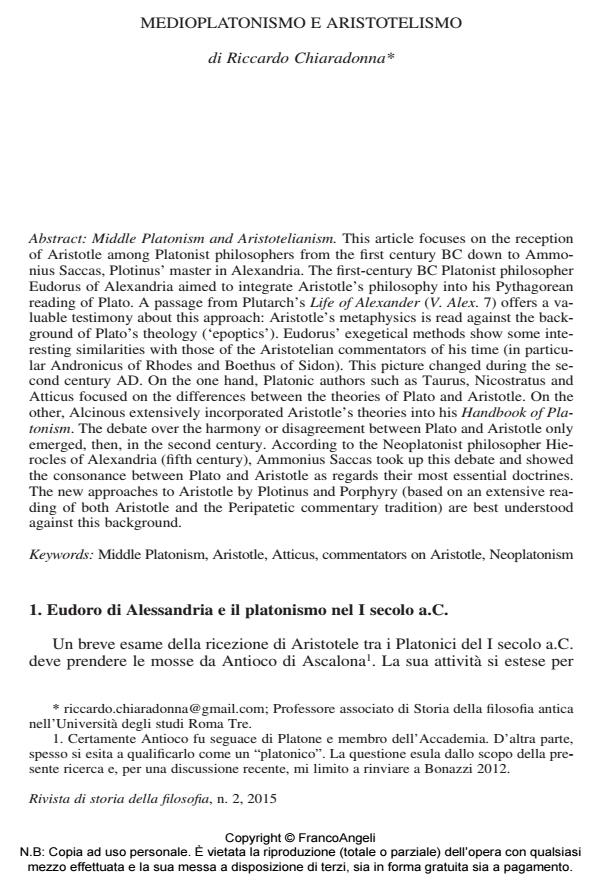Medioplatonismo e aristotelismo
Titolo Rivista RIVISTA DI STORIA DELLA FILOSOFIA
Autori/Curatori Riccardo Chiaradonna
Anno di pubblicazione 2015 Fascicolo 2015/2
Lingua Italiano Numero pagine 22 P. 425-446 Dimensione file 112 KB
DOI 10.3280/SF2015-002008
Il DOI è il codice a barre della proprietà intellettuale: per saperne di più
clicca qui
Qui sotto puoi vedere in anteprima la prima pagina di questo articolo.
Se questo articolo ti interessa, lo puoi acquistare (e scaricare in formato pdf) seguendo le facili indicazioni per acquistare il download credit. Acquista Download Credits per scaricare questo Articolo in formato PDF

FrancoAngeli è membro della Publishers International Linking Association, Inc (PILA), associazione indipendente e non profit per facilitare (attraverso i servizi tecnologici implementati da CrossRef.org) l’accesso degli studiosi ai contenuti digitali nelle pubblicazioni professionali e scientifiche.
This article focuses on the reception of Aristotle among Platonist philosophers from the first century BC down to Ammonius Saccas, Plotinus’ master in Alexandria. The first-century BC Platonist philosopher Eudorus of Alexandria aimed to integrate Aristotle’s philosophy into his Pythagorean reading of Plato. A passage from Plutarch’s Life of Alexander (V. Alex. 7) offers a valuable testimony about this approach: Aristotle’s metaphysics is read against the background of Plato’s theology (‘epoptics’). Eudorus’ exegetical methods show some interesting similarities with those of the Aristotelian commentators of his time (in particular Andronicus of Rhodes and Boethus of Sidon). This picture changed during the second century AD. On the one hand, Platonic authors such as Taurus, Nicostratus and Atticus focused on the differences between the theories of Plato and Aristotle. On the other, Alcinous extensively incorporated Aristotle’s theories into his Handbook of Platonism. The debate over the harmony or disagreement between Plato and Aristotle only emerged, then, in the second century. According to the Neoplatonist philosopher Hierocles of Alexandria (fifth century), Ammonius Saccas took up this debate and showed the consonance between Plato and Aristotle as regards their most essential doctrines. The new approaches to Aristotle by Plotinus and Porphyry (based on an extensive reading of both Aristotle and the Peripatetic commentary tradition) are best understood against this background.
Parole chiave:Middle Platonism, Aristotle, Atticus, commentators on Aristotle, Neoplatonism
- Platonismo e aristotelismo nelTimaeusdi Cicerone Selene I. S. Brumana, in Elenchos /2022 pp.249
DOI: 10.1515/elen-2022-0015
Riccardo Chiaradonna, Medioplatonismo e aristotelismo in "RIVISTA DI STORIA DELLA FILOSOFIA" 2/2015, pp 425-446, DOI: 10.3280/SF2015-002008